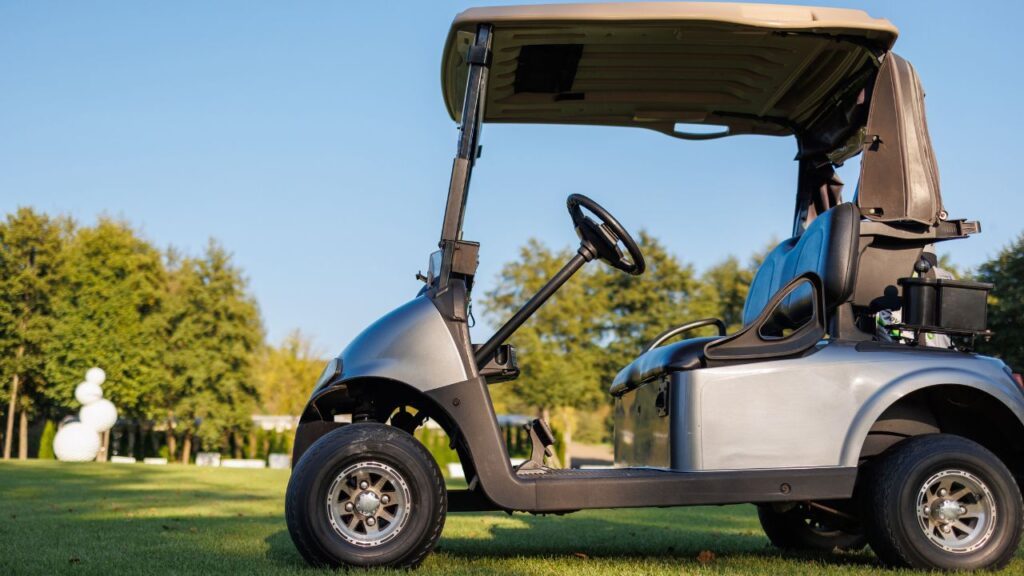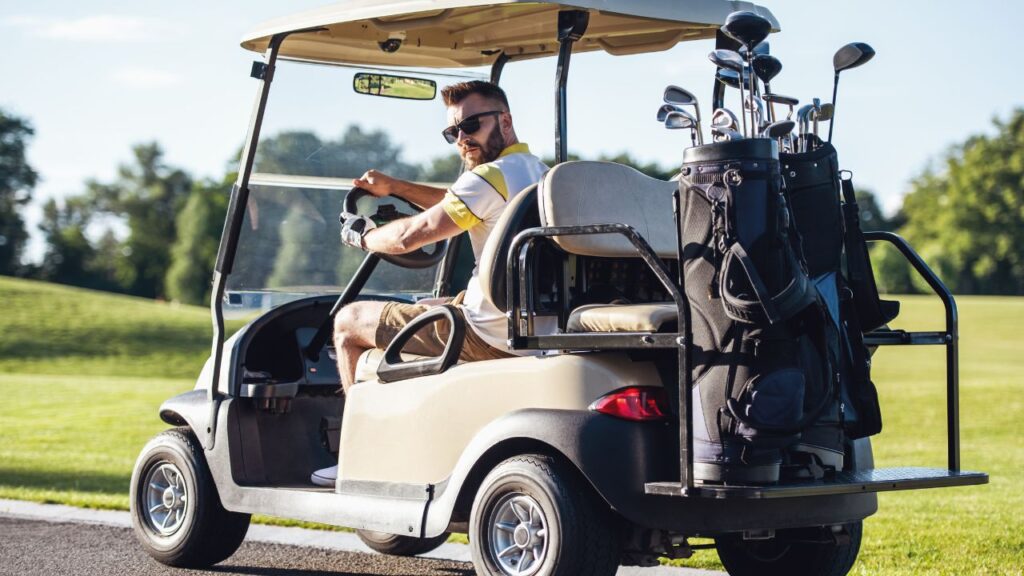Driving a golf cart may seem like a leisurely activity that requires no formal training or licensing. After all, it’s a small vehicle typically used on golf courses or in gated communities. However, whether you need a license to drive a golf cart is more complex than it may initially seem. While many states do not require a driver’s license to operate a golf cart, there are still important considerations to remember, such as local regulations, age restrictions, and where you plan to use the cart. This article will delve into the various factors determining whether you need a license to drive a golf cart, providing a comprehensive understanding of the rules and requirements.
Whether you’re thinking of zipping around your local golf course or cruising through your retirement community, it’s crucial to understand the legalities surrounding using golf carts. While the restrictions and regulations can vary from place to place, it’s essential to know the specific requirements of your intended location before hitting the accelerator. Not only will this ensure your safety and the safety of others, but it will also help you avoid any potential legal troubles. So, if you’ve ever wondered whether you need a license to drive a golf cart, stick around as we explore the different aspects you need to consider to answer that question.

Credit amazon.com
Understanding the legal requirements
Are you a golf enthusiast who loves to zip around the course in your trusty golf cart? If so, it’s essential to understand the legal requirements surrounding the operation of these vehicles. While golf carts may seem small and innocuous, they are considered motor vehicles in many jurisdictions and are subject to specific regulations. This section will delve into the legal requirements for driving a golf cart, including the need for a license, age restrictions, and where you can drive them.
First, do you need a license to drive a golf cart? The answer depends on where you plan to operate it. In many places, particularly golf courses and private properties, golf carts are exempt from the requirement of a driver’s license. However, this exemption is only sometimes applicable, and local regulations can vary significantly.
While you may not need a driver’s license to operate a golf cart on a golf course, some states require a specific type of permit or license for off-course use. For instance, Florida issued a “low-speed vehicle” license for golf carts to be driven on public roads with posted speed limits of 35 mph or less. Similarly, in South Carolina, you need a “Golf Cart Operator’s Permit” to drive a golf cart on secondary roads. Therefore, it is crucial to familiarize yourself with the regulations in your state or municipality to ensure compliance.
Another factor to consider is the age restriction for operating a golf cart. While teenagers may be thrilled by the prospect of driving a golf cart, many jurisdictions require operators to be a certain age. Depending on the location, this age limit can range from 14 to 16. Additionally, some states mandate adult supervision if the operator is below a specific age. These restrictions ensure the vehicle’s safe operation and protect the driver and those around them.
Furthermore, it’s essential to understand where you can legally drive a golf cart. In most areas, golf carts are intended for off-road use and are not permitted on public roads. However, limited exceptions exist. For example, golf carts might traverse certain public roads in communities with well-defined cart paths or designated lanes. To avoid legal issues, respecting and adhering to the rules and regulations for golf cart usage in your area is crucial.
Moreover, it’s worth mentioning that even if you are legally allowed to operate a golf cart on public roads, there are often additional requirements. These can include safety features like headlights, taillights, turn signals, and seat belts. Many states also require golf carts to be registered, insured, and display a license plate or permit. These requirements aim to ensure that golf cart operators are taking necessary precautions and maintaining the safety of themselves and others.
To summarize, while golf carts may seem like a fun and casual mode of transportation, it is essential to understand the legal requirements surrounding their operation. The need for a license varies depending on your location and the purpose of your driving. Moreover, age restrictions and limitations on where you can drive a golf cart are typically in place to ensure safety. By familiarizing yourself with the specific regulations in your area, you can enjoy your golf cart responsibly and legally.

Credit amazon.com
Different regulations by state
The rules and regulations regarding driving a golf cart vary from state to state. It’s essential to familiarize yourself with the specific guidelines imposed by your state, as they can significantly impact whether you need a license. Let’s take a closer look at the different regulations governing the use of golf carts across various states.
Starting with California, a state known for its love of golf and outdoor recreation, the laws regarding golf cart usage are strict. To operate a golf cart on public roadways, drivers must have a valid driver’s license, regardless of age. This requirement also extends to off-road trails or paths open to motor vehicle traffic. Additionally, operators must register their golf carts with the Department of Motor Vehicles and carry proof of liability insurance.
Heading east to Florida, one of America’s golfing paradises, the rules regarding golf cart operation are slightly different. In Florida, drivers under 14 are prohibited from operating a golf cart on public roads except when crossing a road at an intersection. However, with the owner’s consent, they can drive on designated golf cart paths or private property. Additionally, drivers aged 14 and above are generally not required to have a driver’s license to operate a golf cart.

Credit amazon.com
Similar rules and regulations apply in Arizona, which boasts numerous golf communities and courses. Drivers only need a driver’s license to operate a golf cart if they intend to drive on a road with a speed limit above 25 miles per hour. However, operators must be at least 16 years old and carry a valid identification card. Moreover, golf carts must have headlights, taillights, and reflectors to drive at night.
In Texas, the rules surrounding golf cart usage are stricter. While drivers younger than 18 are generally not required to have a driver’s license, anyone operating a golf cart on public roads must have a valid driver’s license and carry liability insurance. Also, golf carts must have safety features, including reflectors and headlights, to be driven on public roadways.
Venturing up to New York, a state with a different climate and a bustling golfing scene, the regulations are more lenient. Golf carts may only be operated on public highways in New York if authorized by local law. However, individuals with disabilities can operate modified golf carts on public streets or roads with a speed limit of 40 miles per hour or less, as long as they have a disability license plate or parking permit.
These are just a few examples of the varying regulations you may encounter concerning the use of golf carts in different states. It is important to remember that these regulations are subject to change, and it is essential to consult your local Department of Motor Vehicles or transportation authority for the most up-to-date information regarding golf cart operation in your area.
Overall, while driving a golf cart may seem like a fun and leisurely activity, it is crucial to understand and abide by the regulations established by your state. This knowledge will ensure your safety and help you avoid any unnecessary legal trouble. So, before hopping behind the wheel of a golf cart, take the time to familiarize yourself with your state’s specific rules and regulations.
Experienced Legal Support From Maison Law
When it comes to legal matters, having an experienced and knowledgeable attorney by your side can make all the difference. At Maison Law, we understand the complexities of the legal system and are dedicated to providing our clients with the highest legal support.
With a team of experienced attorneys who specialize in various areas of law, we are equipped to handle a wide range of legal issues. Whether you are facing a personal injury claim, need assistance with estate planning, or are dealing with a business dispute, we have the expertise to guide you through the process.
One area of law that we specialize in is motor vehicle regulations. If you need clarification on the requirements for operating a golf cart, we can provide the legal support and advice you need.
Exceptions to the rule
While it’s generally understood that a driver’s license is necessary to operate a motor vehicle, there are instances when exceptions to this rule are made. For golf carts, the requirement for a permit can vary depending on the specific circumstances and location. Let’s explore some of the exceptions that may apply in certain situations.
Private Property and Golf Courses
One of the key exceptions to the rule regarding licenses for golf carts is when they are operated exclusively on private property. Many individuals own golf carts for personal use on their land, such as large estates or farms. In such cases, where the vehicle is not being driven on public roads, the requirement for a driver’s license is often waived. However, it’s important to note that these exceptions may not be applicable in all jurisdictions, so it’s wise to double-check local laws and regulations.

Credit golf cart license
Golf courses are another setting where exemptions are commonly made. Golf carts are an integral part of enjoying a round of golf, and it would only be practical to require some players to have a driver’s license. Thus, individuals operating golf carts on the course are typically exempted from needing a permit as long as they adhere to the designated pathways and follow any additional rules the golf club sets.
Age Restrictions for Minors
Many places have specific age restrictions for operating a golf cart without a driver’s license. While these vary by jurisdiction, they generally allow minors, typically around 14 or 16, to drive a golf cart without a permit. The rationale behind this exception is that golf carts are considered relatively safer than regular motor vehicles and have limited speed capabilities. However, even in these cases, minors must be supervised and follow applicable local regulations.
Tourist Areas and Retirement Communities
Specific areas that attract large numbers of tourists, such as amusement parks and beachfront communities, may have different rules regarding golf cart licenses. These locations often have designated areas where golf carts can be driven, typically at lower speeds. Visitors may operate golf carts without permits, provided they stay within these zones.
Retirement communities are another example of where different rules apply. Many retirement communities have regulations and guidelines for using golf carts. Residents may be allowed to use golf carts without a driver’s license, ensuring convenient and accessible transportation within the community.
Temporary Permits and Special Events
For special events, festivals, or other temporary situations, a permit may be issued that allows individuals to operate golf carts without a license for a limited period. These permits are usually obtained through the local government or event organizers and often require adherence to specific conditions, such as staying within designated areas or adhering to particular hours of operation. While the general rule for driving a motor vehicle necessitates a driver’s license, exceptions are often made for golf carts in various scenarios. These exceptions include private property usage, golf courses, age restrictions for minors, tourist areas, retirement communities, and temporary permits for special events. However, it’s important to note that these exceptions can vary by jurisdiction, so reviewing and understanding the local laws and regulations where you plan to operate a golf cart is crucial.
Benefits of having a license
When driving a golf cart, you might wonder if a license is necessary. After all, it’s just a small vehicle used on a golf course, right? While it seems like a trivial requirement, obtaining a license for driving a golf cart has several benefits that can contribute to a safer and more enjoyable experience. Let’s explore these advantages to understand why a permit is genuinely beneficial.
First and foremost, having a license demonstrates a certain level of competence and knowledge about operating a golf cart. By obtaining a permit, you prove you have the necessary skills to operate the vehicle safely and responsibly. This ensures not only your safety but also the safety of those around you, including other golfers on the course or pedestrians nearby. Operating a golf cart without a license puts you at risk of causing accidents or mishaps due to a lack of training or familiarity with the vehicle.
Obtaining a license also provides a sense of confidence and assurance while driving a golf cart. Knowing that you have completed the required training and passed any necessary tests can make you feel more secure and prepared behind the wheel. This added confidence can enhance your overall experience on the golf course, allowing you to enjoy your game without unnecessary worries or insecurities. It can be comforting to know that you have met the necessary standards and are well-equipped to handle the challenges that may arise while driving a golf cart.

Credit amazon.com
Moreover, having a license may grant you access to certain privileges or opportunities unavailable to unlicensed drivers. Some golf courses enforce strict regulations for driving a golf cart, requiring valid licenses to rent or operate one. By having a license, you can ensure that you will take advantage of the chance to explore the entire golf course or participate in events that involve golf carts. Additionally, holding a license can provide a competitive edge when securing job opportunities in fields where driving a golf cart is required, such as golf courses, resorts, or event venues. Employers often prioritize candidates with the necessary licenses, saving them time and resources on additional training.
Furthermore, having a license enables you to be an ambassador for responsible golf cart driving. By meeting the legal requirements and demonstrating your commitment to safe practices, you become a role model for others, especially newer or inexperienced drivers. Your license shows that you take the responsibility of driving a golf cart seriously and are willing to abide by the rules and regulations set forth to ensure the well-being of everyone on the golf course. This helps promote a culture of safety and consideration among golf cart users, enhancing the overall experience for everyone involved.
While obtaining a golf cart license may initially seem unnecessary, it brings several benefits worth considering. From demonstrating competence and enhancing confidence to granting access to additional privileges and contributing to a culture of safety, having a license contributes to a safer and more enjoyable experience on the golf course. So, why not obtain a license and take advantage of these benefits? Drive safely and enjoy your golfing adventures!
Safety considerations for driving a golf cart
When it comes to driving a golf cart, safety should always be your top priority. While golf carts may seem innocent and easy to handle, they can still pose risks if not operated responsibly. Whether driving a golf cart on a golf course or using it for recreational purposes, it’s essential to understand and abide by specific safety considerations. Here, we will discuss a few key aspects to keep in mind to ensure a safe and enjoyable ride.
First and foremost, it’s crucial to familiarize yourself with the golf cart’s controls and features before taking it for a spin. Like any other vehicle, golf carts have specific functions and operations that vary between models. Take the time to read the user manual provided by the manufacturer, paying close attention to the controls, safety features, and any limitations or restrictions outlined in the guide. This will allow you to understand better how the cart operates and prevent avoidable accidents.
The following important consideration is always wearing the necessary safety equipment while driving a golf cart. Just because golf carts are smaller than regular vehicles doesn’t mean you should neglect safety measures. In most cases, it is recommended to wear a seatbelt, especially if the cart is equipped with one. Additionally, wearing closed-toe shoes will protect your feet and prevent potential injuries from mishaps or sudden stops. Safety should always be a priority, no matter how short or casual your ride may be.
Following all traffic rules and regulations is crucial when operating a golf cart. Even though golf carts are typically operated in areas with less traffic, it’s essential to treat them as any other vehicle. Observe and follow speed limits, yield to pedestrians, and always be mindful of other drivers on the road. It’s also wise to avoid distractions while driving, such as using your phone or engaging in conversations that may divert your attention from the road.
If you’re driving a golf cart on a golf course, be mindful of where you drive and respect the course’s rules. Avoid driving on areas marked off-limits, such as putting greens or tee boxes. Stay on designated paths and avoid damaging the turf, which can affect the course’s aesthetics and potentially cause harm to the cart or its occupants. Furthermore, be considerate of golfers and yield the right of way to them whenever necessary.
Frequently Asked Questions
1. Do you need a license to drive a golf cart?
Yes, you need a valid driver’s license to operate a golf cart in most states and countries. It’s essential to check the specific regulations in your area to ensure compliance with the law.
2. Can kids drive golf carts?
In most places, the minimum age to operate a golf cart is 16, and some areas may have additional restrictions or requirements for younger drivers. Familiarizing yourself with the local laws and regulations regarding underage golf cart operation is essential.
3. Are there any safety regulations for driving a golf cart?
Yes, just like driving any other vehicle, safety regulations must be followed when operating a golf cart. These may include wearing seatbelts, following designated paths, and adhering to speed limits. It’s crucial to prioritize safety when driving a golf cart.
4. Can I drive a golf cart on public roads?
In some areas, golf carts are permitted on public roads with certain restrictions and regulations. To comply with road regulations, it’s essential to check the local laws and ensure that the golf cart has the necessary safety features, such as lights and turn signals.
5. Do I need insurance for a golf cart?
Depending on the location and intended use of the golf cart, insurance may be required. It’s essential to consult with local authorities or insurance providers to determine the necessary coverage for your golf cart.
6. Are there any specific rules for operating a golf cart on a golf course?
Golf courses may have rules and regulations for driving golf carts, including designated paths, speed limits, and course etiquette. It’s essential to familiarize yourself with these rules before operating a golf cart on a golf course.
7. Can I modify my golf cart?
Modifying a golf cart, such as adding a lift kit or altering the engine, may have legal implications and could impact the vehicle’s safety and compliance. It’s crucial to check with local authorities and adhere to any regulations regarding golf cart modifications.
8. What should I do if I have a golf cart accident?
In a golf cart accident, following the same procedures as you would for any other vehicle accident is essential. This may include exchanging information with other parties involved, notifying the authorities, and seeking medical attention if necessary. Prioritize safety and responsibility when operating a golf cart.
Conclusion
Lastly, never overload a golf cart. Even though a golf cart appears spacious enough, it can still safely carry an excessive number of passengers or cargo. Overloading a golf cart can lead to losing control, increased braking distances, and potential tipping. Always abide by the manufacturer’s recommended weight capacity and distribute the weight evenly to maintain stability while driving.
Driving a golf cart can be a fun and convenient means of transportation. Still, safety should never be taken lightly. By familiarizing yourself with the key considerations mentioned above, you can ensure a safe and enjoyable ride for yourself and others. Remember, responsible driving goes a long way in preventing accidents and maintaining a pleasant experience on and off the golf course.
Whether you need a golf cart license depends on your local jurisdiction’s rules and regulations. While many areas do not require a permit recreational golf cart riding license on designated courses or private properties, it is crucial to check with your local authorities to be specific. It’s always better to be safe than sorry and comply with the necessary regulations to avoid legal issues or potential accidents. So, whether you’re planning a leisurely golfing adventure or want to cruise around your neighborhood, make sure you understand the licensing requirements in your area to ensure a smooth and enjoyable ride.









